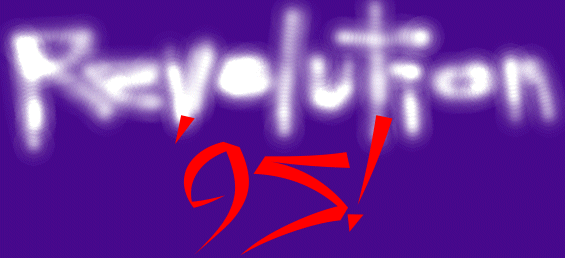

These days not much new technology excites us anymore. Sure, we might be a little thrilled over a longer-range cell phone or a high-definition version of something that was sharp enough to live with as it was. But back in the mid-90's, it was a different story. Back then, any computer graphic was amazing and you could stare at it for hours. "Wow, it's not really there, yet it looks like it's THERE!!" Nowadays, when every single animated movie is CGI and high-powered computers are everywhere, the shock of it has worn off and it's just part of what you see every day. But back in 1994....woo, it was an exciting time to be alive. Well, we're back in '94 again. The Sega CD isn't so hot, and the threat from that Playstation is real(but easy enough to get rid of). The buzzword of the year is technology; maybe if Genesis owners could upgrade their systems somehow, that would give Sega the edge. Well, the Sega CEOs in America were thinking THAT...the Japanese CEOs weren't even considering it, sticking to making a new console entirely. That fall(the Donkey Kong Country fall), Sega's American team came out with something called the 32X which was supposed to make your Genesis a 32-bit system. We now know all it really did was increase the Genesis's capabilities to the Super NES's, and nothing more. But they thought it would sell.
But enough about Sega's strikes. They were clearly going insane with add-on releases, for a system that wasn't going to last much longer. Most of us would rather buy, you know, a GAME. (And we also would not be getting another good Sonic until 1999.) Which is another reason why DKC sold so well, for us it was the best of both worlds and it turned the console wars to the SNES's favor for the rest of the 16-Bit days. "At least Sega didn't try releasing a VR system," you say. Oh, they tried all right...but this time, they didn't follow through.
While the V-Boy fiasco was going on, the '95 E3(Electronic Entertainment Expo) was too. This was going to be the day when Sony would announce their official plans for releasing the Playstation in North America, as well as when Sega would announce the same thing for their next system, the Saturn. Having pulled all sorts of tricks out of their peripheral hat that backfired, Sega knew it was going to have to come up with something clever and shocking to get the attention AWAY from Sony that fall. What they did was...well, you'll find out. Even still, people wondered how Sony was going to counter that wallop of an announcement. A surprise release? How do you beat fervor for that? From this point on it was only downhill for the once-mighty Sega. Their new machine wasn't very good, and it's 3D capabilities were crummy. It was also hard to program a game for it, and the controller had been redesigned for the US to make it look cool, but play terribly. Add to that, there wasn't a Sonic title on the system ever. Well, okay...there were a couple of Sonic games, but certainly nothing like we'd seen in the past, so they might as well have not existed. The Saturn's sheer stinkiness, coupled with the fact that the company now had to USE this thing for four years, plunged Sega into a debt hole that even the Dreamcast couldn't get them out of, and ultimately led to their departure from the console business in 2001, becoming just another third-party game maker. Sega tripped and fell, and now it was up to Nintendo to combat the rising power of the Playstation. And really, at the time it seemed like a sure win for Nintendo. The N64 came out in Japan, and millions ran out and bought it. Then millions ran back and returned it, after discovering there was almost nothing out for it. The following year, 1997, saw few new games for the N64; the amazing revolution everyone was expecting from this console never happened. And there was just no point in buying a Saturn. And the Playstation started looking more and more attractive. When I look back on all this now, it's pretty embarrassing. Here you have guys who had years of experience, and they're companies I respect well...and they handled the turn of technology with the gracefulness of a breakdancing hippopotamus. Hideous mistakes were all that ever happened, and I have to wonder what things would have been like if Sony had not taken a chance on being the new player. It's likely the N64 would have dominated anyway by default, and we would have gotten so bored with it, we would have stopped playing games for good, declared them as toys for kids, and got jobs. Shivers!
As much as I hate Sony for taking away forever the days where game makers ran game COMPANIES, I have to be grateful for the calming influence they had in making video games mainstream. America is hideously closed-minded about all forms of imagination, labeling all of it for children and demanding yet another by-the-numbers action flick or TV show. Sony's normal console, with its normal games and normal system of data storage, made games themselves normal. (I say, what's wrong with weirdness? Pound for pound it's better. But what do I know....)
The media was now promising us a giant leap in innovation; a technological revolution. Most of them called it the oncoming "Information Superhighway." Good thing that bulky term died, but stupid media terms aside, we were told that anytime now, all media would converge...computer graphics, too expensive to see for years, would become commonplace...we would be able to instantly access anything at any time...movies would become impossibly gorgeous...on and on and on.
Some of it was obviously here, it just wasn't seen often because in the past it had been too expensive. But 1994 was the banner year; it was at this time CGI animation somehow went down in price and we started seeing more things that used it. Case in point was Donkey Kong Country.
Things just weren't going to change as far as our phones and cinema were concerned. Some of the most drastic changes of the 90's were going to take place in the world of gaming, and the existence of this game was clear proof of that. It was THE game of 1994; I dreamed of even getting a chance to play it, but knew I never would, because it was too good for me.
They recently released a DKC for the Game Boy Advance and what I heard from critics, almost universally, was "What did I see in this? It's awful!" New technology was a powerful, powerful blinder indeed. After '94, for a while, every game had to have its own tech gimmick to sell.
And "gimmick" is the keyword here. The longtime veteran companies of the video game industry knew change was afoot, but no one really knew in what way it was going to change. And looking back on how they handled it now...is quite shocking. It's a level of stumbling, misses and hard knocks that could put the Three Stooges to shame. It's also pretty funny to read in retrospect, so pull up a chair.
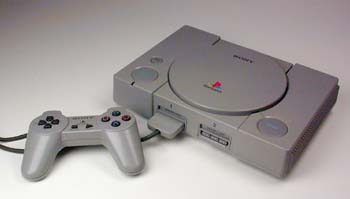 In '94 Sony was preparing to enter the game world with its very first console, the Playstation. Let me tell you how this was percieved in '94. The first time I saw the thing--this is true--my first thought was, "That's for little kids."
In '94 Sony was preparing to enter the game world with its very first console, the Playstation. Let me tell you how this was percieved in '94. The first time I saw the thing--this is true--my first thought was, "That's for little kids."
Well, it sure looked that way to me. It didn't look as hip as the machines Sega and Nintendo were planning, and its name was "Playstation." A word with "Play" at its front always meant kindergarten material, i.e. Playground, Ronald's Playplace...
Surely, with their expertise and large share of the market, Nintendo and Sega could crush this insignificant insect. Sega had already taken the first shot, with the SEGA CD. OOOOHHHHH.....so techy! You better click there, otherwise you won't get the full effect.
Most companies realized that the CD, and disks like it, were the future method of storage for all data(well, except Nintendo). Sega's CD came out in '92 in Japan, '93 in the US. Maybe if Sega had put out some stuff that took advantage of all that space in the right way, they would have had better luck. But no. People who bought these things would want technology that was IN YOUR FACE. So thusly, the majority of titles released for the Sega CD had heavy emphasis on video, little emphasis on actually playing a game. In other words: the titles were kind of like a DVD menu, except they were actually marketed as games. Add to this the price of the CD add-on itself...and few people bought it. Strike one.
 And maybe it might have. When I first glimpsed the 32X, I thought "Hey, Sega is smart...this is the end of having to buy a new system every 5 years." Of course, I knew nothing of what it really was, but few kids did. The Internet(another techy wow thingy) was beginning to really boom, and also be called "The Internet." Even still, free info wasn't widely available because we didn't know how to really use it yet. So maybe we might have all bought 32Xes...if it hadn't turned out that Sega was going to release a new machine ANYWAY, which we all heard right after this came out, and so we all didn't buy the 32X. Strike two.
And maybe it might have. When I first glimpsed the 32X, I thought "Hey, Sega is smart...this is the end of having to buy a new system every 5 years." Of course, I knew nothing of what it really was, but few kids did. The Internet(another techy wow thingy) was beginning to really boom, and also be called "The Internet." Even still, free info wasn't widely available because we didn't know how to really use it yet. So maybe we might have all bought 32Xes...if it hadn't turned out that Sega was going to release a new machine ANYWAY, which we all heard right after this came out, and so we all didn't buy the 32X. Strike two.
So, what's Nintendo doing? Well, they're not wasting any time with add-ons, which is good. They're busy readying the Nintendo 64 for release, and what's expected of it is mindblowing...it's looking like the Nintendo Monopoly could return upon release of this thing, if Sega can't get its act together. Oh yeah, there's that little tan thing from Sony...but who cares?
But the main problem is...the N64 was taking longer than expected to create. There had to be something cool they could make to distract gamers from the wait. So they turned to Gunpei Yokoi, a hardware creator whose track record was flawless...he had created the Game and Watch(the first series of cheesy LED plastic games), and then the Game Boy. THE Game Boy, people. Yokoi was now given the task to make the next innovation in portable games.
Another thing people were saying was going to happen in the mid-90's was virtual reality. Everybody thought that in the future, you would strap goggles with TVs on them to your face, putting you in a fake 3-D world, and that would be the way to play a game, or watch a movie, or perform delicate surgery--whatever.
But there's a difference between virtual reality and REAL reality. There had been several virtual reality machines sold already, but every single one of them made people throw up from motion sickness, gave them headaches, or worse...and all of them were $500 or more. Virtual reality worked in theory, but not off the drawing board...and that is the reason why you don't see it today.
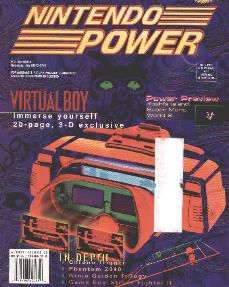 Surely Nintendo, the most cautious and conservative of all the game companies, should have seen some of these reports about virtual reality turning out to not be so hot. But maybe they figured Yokoi could do no wrong, and so they let him create this thing--the VIRTUAL BOY, Nintendo's only true bomb system. It made people less sick than other VR machines, but that's because it wasn't as realistic as those. To save battery time and allow for a hi-res screen, Yokoi made it without color. Well, he used a color, but it was red. Red red red.
Surely Nintendo, the most cautious and conservative of all the game companies, should have seen some of these reports about virtual reality turning out to not be so hot. But maybe they figured Yokoi could do no wrong, and so they let him create this thing--the VIRTUAL BOY, Nintendo's only true bomb system. It made people less sick than other VR machines, but that's because it wasn't as realistic as those. To save battery time and allow for a hi-res screen, Yokoi made it without color. Well, he used a color, but it was red. Red red red.
It wasn't really portable either, but he tacked on the "Boy" part anyway. So, what were my thoughts on the Virtual Boy? They were, "That's cool that we've finally got a VR system from a major company, but it's got some of the same flaws Game Boy has...it doesn't look too hot." I never played one either.
The games also weren't very good, and this is Nintendo we're talking about. They actually thought it'd survive on a Mario Tennis game? The system got no Mario platformers or Zelda action...in fact, it got 12 games in all. What's really sad: this is the only system with a game that starred Nester.
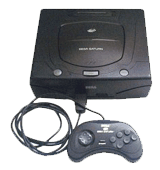 A Sega representative walked up to a podium in front of the press, cleared his throat...and said neither he nor his company feared competition from Sony because....IT WAS TOO LATE!! THEY HAD LAUNCHED THE SYSTEM JUST NOW, AS THE MAN SPOKE, EFFECTIVE IMMEDIATELY!!! AH HA HA HA HAAAAA!!!!! He then gave a few more specifics, like its price($399), and some of the games and capabilities before leaving.
A Sega representative walked up to a podium in front of the press, cleared his throat...and said neither he nor his company feared competition from Sony because....IT WAS TOO LATE!! THEY HAD LAUNCHED THE SYSTEM JUST NOW, AS THE MAN SPOKE, EFFECTIVE IMMEDIATELY!!! AH HA HA HA HAAAAA!!!!! He then gave a few more specifics, like its price($399), and some of the games and capabilities before leaving.
I wonder how long Sega went thinking this was a shrewd move before reality set in and they realized what they had just done. You might think that releasing something six months ahead would give you the lead over your competitor. Well, in some cases. But not in the case of a console, because...almost no developer of a Saturn game was prepared for an early launch either. So though the Saturn was out, virtually nothing could be played on the machine until that fall, and by then Sony would arrive anyway.
Later that day, a Sony rep walked up to a similar podium, cleared his throat, and said................
"$299." And the crowd went nuts. And Sega was sunk.
Like I said, the market was changing. And this company had made the mistake of thinking that the loudest, coolest things would always work. Sucks to be them.
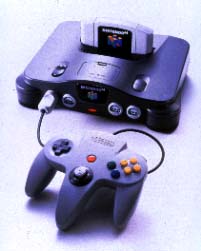 The big N had decided to skip the 32-bit trend entirely and go straight up to 64 bits. Maybe that's what was taking them so long. But the work showed. One glimpse of Super Mario 64 set the world on its ear, and the thing had so many revolutionary new ideas. A stick made more sense than a pad for this new 3D genre the N64 was about to create. And that Z-button...tres cool! Imagine a shooter that finally felt like one, no "light gun" required. The visuals were just as good as the controller...unlike Playstation 3D, N64's polygons never "wavered" or had visible pixels on the texture maps, and were very smooth. Simply put, there was no way anyone could imagine this thing not taking the lead in 1996.
The big N had decided to skip the 32-bit trend entirely and go straight up to 64 bits. Maybe that's what was taking them so long. But the work showed. One glimpse of Super Mario 64 set the world on its ear, and the thing had so many revolutionary new ideas. A stick made more sense than a pad for this new 3D genre the N64 was about to create. And that Z-button...tres cool! Imagine a shooter that finally felt like one, no "light gun" required. The visuals were just as good as the controller...unlike Playstation 3D, N64's polygons never "wavered" or had visible pixels on the texture maps, and were very smooth. Simply put, there was no way anyone could imagine this thing not taking the lead in 1996.
One problem: we were so wowed by Super Mario 64, we forgot to ask Nintendo if anybody was planning on making anything else. It turned out that all that high-quality stuff came with a price of technical confusion to the poor people coding the games for a living, leading to lots of delays for many of the N64's titles. There was also the problem of still using cartridges to store the games in. Nintendo was fearingly clinging to this format for another 5 years, having a phobia of easy piracy and long CD loading times. Both these fears turned out to be making a mountain out of a molehill.
Not only to gamers, who wanted to play something good NOW. But to developers, who found the PS a lot simpler. Thusly, a lot of the good talent migrated over to Sony, and just started throwing Nintendo their leftovers. Sony also took note that the gamer generation was growing older, and used the plain design of their machine to their advantage, offering grittier and more mature stuff than people were used to from Nintendo.
From here, it was an easy win. And when Squaresoft, the most valuable asset a game company can have in Japan, moved to Sony to make its next game...that was the final straw. The race was over, and the new guy who barely did anything had won the whole mess.